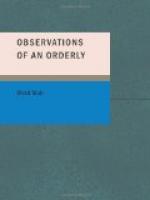It was long after my own supper hour had come and gone that I was able to say au revoir to the ward. The cleansing of the grease-encrusted meat-tin was a travail which alone promised to last half the night. (Mrs. Mappin eventually lent me her assistance, and later I became more adroit.) And the calls of “Orderly!” from the bed patients were interruptions I could not ignore. But at last some sort of conclusion was reached. Mrs. Mappin put on her bonnet. The night orderly, who was to relieve me, was overdue. Sister, discovering me still in the kitchen, informed me that I might leave.
“You ain’t ’ad any supper, ’ave you?” said Mrs. Mappin. “You won’t get none now, neither. Should ’ave done a bunk a full hower back, you should.”
She drew me into the larder, and indicated the debris of our patients’ repast. “A leg of chicken and some rice pudden. Only wasted if you don’t ’ave it.”
“But is it allowed—?” I was, in truth, not only tired but ravenous.
Sister, entering upon this conspiratorial dialogue, unhesitatingly gave her approval.
Cold rice pudding and a left-over leg of chicken, eaten standing, at a shelf in a larder, can taste very good indeed, even to the wearer of a spick-and-span grey lounge suit. I shall know in future what it means when my restaurant waiter emerges from behind the screened service-door furtively wiping his mouth. I sympathise. I too have wolfed the choice morsels from the banquet of my betters.
II
LIFE IN THE ORDERLIES’ HUTS
In May, 1915, when I enlisted, the weather was beautiful. Consequently the row of tin huts, to which I was introduced as my future address “for the duration,” wore an attractive appearance. The sun shone upon their metallic sides and roofs. The shimmering foliage of tall trees, and a fine field of grass, which made a background to the huts, were fresh and green and restful to the eye. Even the foreground of hard-trodden earth—the barrack square—was dry and clean, betraying no hint of its quagmire propensities under rain. Later on, when winter came, the cluster of huts could look dismal, especially before dawn on a wet morning, when the bugle sounding parade had dragged us from warm beds; or in an afternoon thaw after snow, when the corrugated eaves wept torrents in the twilight, and one’s feet (despite the excellence of army boots) were chilled by their wadings through slush. Meanwhile, however, the new recruit had nothing to complain of in the aspect of the housing accommodation which was offered him. Merely for amusement’s sake he had often “roughed it” in quarters far less comfortable than these bare but well-built huts—which even proved, on investigation, to contain beds: an unexpected luxury.
“I’ll put you in Hut 6,” said the Sergeant-Major. “There’s one empty bed. It’s the hut at the end of the line.”




